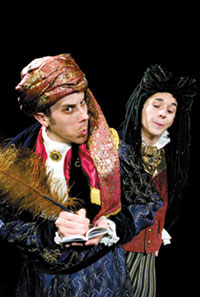University Theatre explores obsessions, love in comedy, tragedy
Class and politics, unhealthy obsessions and forbidden love are common themes explored in two productions being staged by University Theatre this semester. Timeless and universal states of the human condition, right? Sure, but these two plays are miles apart in tone, mood and outcomes. “The Imaginary Invalid” by Moliere is a lively comedic romp from 1673; “Blood Wedding” is a tragedy written by Spanish dramatist and poet Frederico Garcia Lorca in 1932. Try to guess which play has a happy ending.

Charlie Bauer as Argan and Jon Hause as De Bonnefoi in the University Theatre’s production of “The Imaginary Invalid.” The production runs Oct. 23-Nov. 7.
Undoubtedly, we all know someone a little bit like Argan, who gives “The Imaginary Invalid” its title. Argan is a miser who imagines himself afflicted with all types of illnesses. His life is spent consulting doctors who encourage his delusion (it’s good for their business) and following doctors’ orders.
But medical attention is expensive. Argan wants his daughter to marry a doctor so he can get free medical care, even though she is in love with another. Add to this mix of characters and familial structure sensible servants, icky suitors, a greedy stepmother, disguises and a faked death that reveals true love and loyalty.
The play is directed by Patricia Boyette, professor of acting at UW–Madison. Boyette has cast 11 undergraduate students; most are theater majors. “We haven’t done Moliere in ages. He is still a premiere writer of comedy and one of the best ever,” says Boyette. “His archetypes are still recognizable today.”
Boyette’s production adopts the steampunk style, setting the play during the turn of the century and uses the mechanical technology from the Victorian era of steam power in a mash-up of the modern. The result is a fantastic and decadent costume drama: big, powdered wigs from the 17th century now have dreads; the maid wears a super-short skirt with “killer high-heeled boots,” says Boyette. “We stay true to Moliere, but link it to the contemporary.”
“The Imaginary Invalid” was Moliere’s last work. On stage playing the role of the hypochondriac Argan, he famously coughed up blood during a performance, collapsing and dying later that evening, without the attention of a doctor or the comfort and ministrations of a priest. His death was a bitter irony given the play’s subject of imaginary illness.
Performance dates for “The Imaginary Invalid” are Oct. 23, 24, 29, 30, 31 and Nov. 5-7 at 7:30 p.m.; and Nov. 1 at 2 p.m. A pre-performance lecture will take place Oct. 29, 6:30 p.m.; a post-performance discussion will take place Nov. 5.
The title “Blood Wedding” should tip you off that this is not a frothy rom-com. The play tackles the passion and anguish of forbidden love wrapped in a white-hot feud between families. Dark, brooding and full of poetry and symbolism, “Blood Wedding” chronicles a tragic couple as they confront social expectations in their desire to live and love.
Lorca is known as a poet as well as a playwright and the language in “Blood Wedding” is front and center. The translation by Lillian Groag retains Lorca’s potency and lyricism.
The production is directed by Norma Saldivar, professor of directing. The cast includes 10 brand-new MFA acting students, who are joined by Susan Sweeney, University Theatre professor of voice. The play also features original music composed by guest music director Joe Cerqua, fight choreography by David Daniels, and dance and flamenco from the Dance Program’s Chris Walker.
“I’m thrilled to be working with the new incoming graduate acting company and the wonderful guest artists,” says Saldivar. “The piece is a great example of what happens when one’s passion is subjugated by the demands or constraints of society. With Lorca, you can count on a story full of excitement and passion. We can’t imagine a better way to welcome a new crop of actors to UW–Madison.”
Lighting will play a big role in the production. MFA lighting designer Katie Kudrick creates different environments on blank canvasses. The minimal set is a high-gloss floor and the canvasses, so there is little to distract from Lorca’s poetry.
Like Moliere, Lorca had an unhappy death. It is believed he was executed by the Nationalist forces at the beginning of the Spanish Civil War in August 1936 and buried in a mass grave; one of the many who “disappeared.” The complete circumstances of his death remain a mystery.
Performance dates are Nov. 13, 14, 19-21 and Dec. 3-5 at 7:30 p.m.; and Nov. 22 at 2 p.m. A pre-performance lecture is planned for Nov. 19, 6:30 p.m. A post-performance discussion will take place Dec. 3.
“The Imaginary Invalid” is in the Mitchell Theatre; “Blood Wedding” is in the Hemsley Theatre. Both theaters are in Vilas Hall. Tickets to both productions are available at the Union Theater Box Office during regular box office hours or at http://www.uniontheater.wisc.edu/.
Tags: arts, College of Letters & Science, theater

